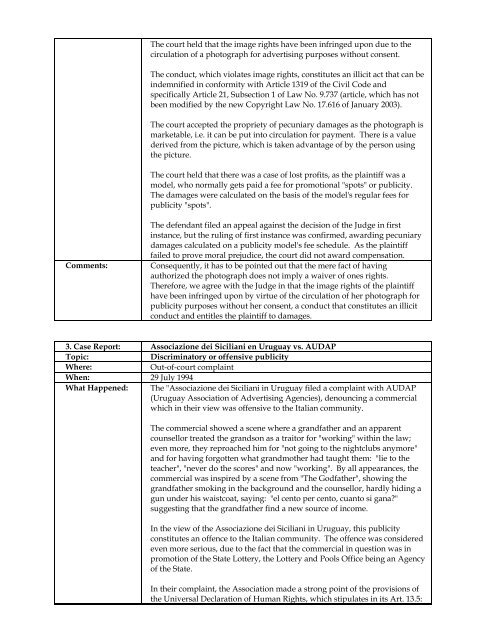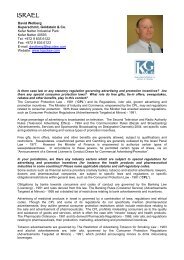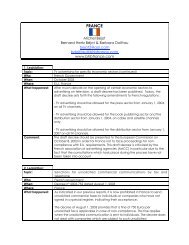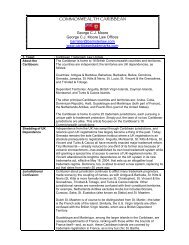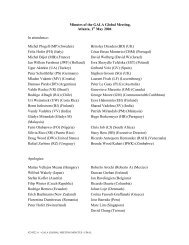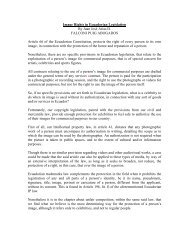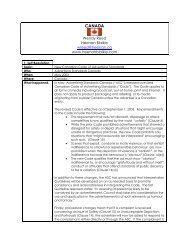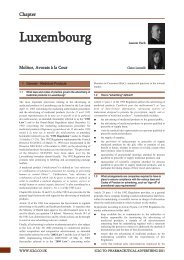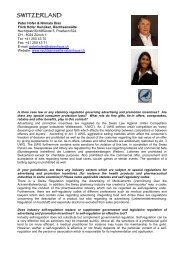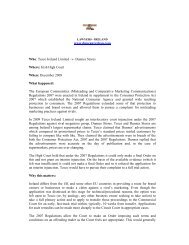list of contributors - GALA
list of contributors - GALA
list of contributors - GALA
Create successful ePaper yourself
Turn your PDF publications into a flip-book with our unique Google optimized e-Paper software.
The court held that the image rights have been infringed upon due to the<br />
circulation <strong>of</strong> a photograph for advertising purposes without consent.<br />
The conduct, which violates image rights, constitutes an illicit act that can be<br />
indemnified in conformity with Article 1319 <strong>of</strong> the Civil Code and<br />
specifically Article 21, Subsection 1 <strong>of</strong> Law No. 9.737 (article, which has not<br />
been modified by the new Copyright Law No. 17.616 <strong>of</strong> January 2003).<br />
The court accepted the propriety <strong>of</strong> pecuniary damages as the photograph is<br />
marketable, i.e. it can be put into circulation for payment. There is a value<br />
derived from the picture, which is taken advantage <strong>of</strong> by the person using<br />
the picture.<br />
The court held that there was a case <strong>of</strong> lost pr<strong>of</strong>its, as the plaintiff was a<br />
model, who normally gets paid a fee for promotional "spots" or publicity.<br />
The damages were calculated on the basis <strong>of</strong> the model's regular fees for<br />
publicity "spots".<br />
The defendant filed an appeal against the decision <strong>of</strong> the Judge in first<br />
instance, but the ruling <strong>of</strong> first instance was confirmed, awarding pecuniary<br />
damages calculated on a publicity model's fee schedule. As the plaintiff<br />
failed to prove moral prejudice, the court did not award compensation.<br />
Comments: Consequently, it has to be pointed out that the mere fact <strong>of</strong> having<br />
authorized the photograph does not imply a waiver <strong>of</strong> ones rights.<br />
Therefore, we agree with the Judge in that the image rights <strong>of</strong> the plaintiff<br />
have been infringed upon by virtue <strong>of</strong> the circulation <strong>of</strong> her photograph for<br />
publicity purposes without her consent, a conduct that constitutes an illicit<br />
conduct and entitles the plaintiff to damages.<br />
3. Case Report: Associazione dei Siciliani en Uruguay vs. AUDAP<br />
Topic: Discriminatory or <strong>of</strong>fensive publicity<br />
Where: Out-<strong>of</strong>-court complaint<br />
When: 29 July 1994<br />
What Happened: The "Associazione dei Siciliani in Uruguay filed a complaint with AUDAP<br />
(Uruguay Association <strong>of</strong> Advertising Agencies), denouncing a commercial<br />
which in their view was <strong>of</strong>fensive to the Italian community.<br />
The commercial showed a scene where a grandfather and an apparent<br />
counsellor treated the grandson as a traitor for "working" within the law;<br />
even more, they reproached him for "not going to the nightclubs anymore"<br />
and for having forgotten what grandmother had taught them: "lie to the<br />
teacher", "never do the scores" and now "working". By all appearances, the<br />
commercial was inspired by a scene from "The Godfather", showing the<br />
grandfather smoking in the background and the counsellor, hardly hiding a<br />
gun under his waistcoat, saying: "el cento per cento, cuanto si gana?"<br />
suggesting that the grandfather find a new source <strong>of</strong> income.<br />
In the view <strong>of</strong> the Associazione dei Siciliani in Uruguay, this publicity<br />
constitutes an <strong>of</strong>fence to the Italian community. The <strong>of</strong>fence was considered<br />
even more serious, due to the fact that the commercial in question was in<br />
promotion <strong>of</strong> the State Lottery, the Lottery and Pools Office being an Agency<br />
<strong>of</strong> the State.<br />
In their complaint, the Association made a strong point <strong>of</strong> the provisions <strong>of</strong><br />
the Universal Declaration <strong>of</strong> Human Rights, which stipulates in its Art. 13.5:


